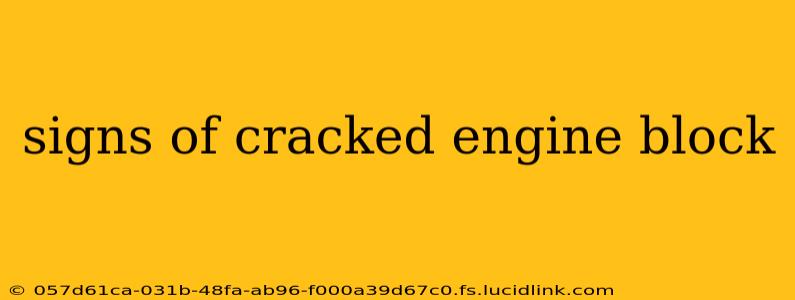A cracked engine block is a serious automotive problem, often requiring costly repairs or even engine replacement. Early detection is crucial to minimize damage and expense. This comprehensive guide will explore the various signs that indicate a potential crack in your engine block, helping you diagnose the issue and take appropriate action.
What is an Engine Block?
Before diving into the signs of a crack, let's briefly define what an engine block is. The engine block is the main structural component of an internal combustion engine. It houses the cylinders, where the pistons move up and down, generating power. A crack in this vital part compromises the engine's integrity and can lead to catastrophic failure.
Common Signs of a Cracked Engine Block
Several indicators can point towards a cracked engine block. These aren't always foolproof, as some symptoms can mimic other issues, but their presence warrants a thorough inspection by a qualified mechanic.
1. Overheating
One of the most common and significant signs of a cracked engine block is persistent overheating. A crack can allow coolant to leak into the engine's combustion chamber or oil system, reducing the coolant's effectiveness and causing the engine to overheat. This is often accompanied by the engine temperature gauge rising rapidly or the overheating warning light illuminating on your dashboard.
2. White Smoke from the Exhaust
If coolant leaks into the combustion chamber, it will turn into steam and exit the exhaust system as white smoke. This smoke is often thicker and more persistent than normal condensation and will usually have a sweet smell due to the antifreeze.
3. Oil Contamination with Coolant (or vice versa)
A crack in the engine block can allow coolant to seep into the engine oil, creating a milky or foamy substance. Conversely, oil contamination in the coolant will show itself as an oily sheen or residue on the coolant. Checking your engine fluids regularly for this discoloration is crucial for early detection.
4. Loss of Coolant
A noticeable and consistent loss of coolant without any visible external leaks is a strong indication of an internal leak, possibly from a cracked engine block. Regularly check your coolant reservoir to monitor levels.
5. External Leaks (Less Common but Significant)
While less common, a crack can sometimes manifest as a visible external leak of coolant. Look carefully around the engine block for any signs of wetness, staining, or dripping coolant. This is often easier to spot on the lower parts of the engine block.
Less Obvious Signs of a Cracked Engine Block
Some signs are less direct but can still point towards a cracked engine block.
6. Low Compression
A crack in the cylinder wall can lead to a loss of compression, meaning the engine struggles to maintain pressure within the cylinders. This can result in decreased engine performance, reduced power, and difficulty starting the engine. A compression test can reveal this issue.
7. Engine Knocking or Pinging Sounds
Though other mechanical problems cause knocking sounds, a cracked engine block can contribute to unusual engine noises as well. These abnormal noises warrant a professional inspection.
What to Do if You Suspect a Cracked Engine Block
If you suspect your engine block is cracked, it is crucial to avoid further driving. Continuing to operate the engine can cause significant additional damage, leading to more expensive repairs. Consult a qualified mechanic immediately for a proper diagnosis and repair plan.
How is a Cracked Engine Block Diagnosed?
A mechanic will typically use a combination of visual inspection, pressure testing, and dye testing to diagnose a cracked engine block. These methods help to locate the crack precisely and determine the extent of the damage.
Can a Cracked Engine Block Be Repaired?
While some minor cracks might be repairable through welding or specialized epoxy, major cracks often necessitate engine replacement or a complete engine rebuild. The best course of action depends heavily on the severity of the crack, the engine's age, and the overall cost of repair.
This article provides information for general knowledge and should not be considered professional automotive advice. Always consult a qualified mechanic for diagnosis and repair of automotive issues.
